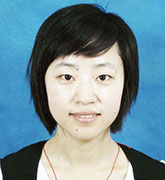
博士,副教授,硕士生导师
王爱丽,女,博士,副教授,硕士生导师,现任江苏大学化学化工学院化工系教师。
2006年毕业于江苏大学化学化工学院应化专业毕业,获工学硕士学位;2010年毕业于江苏大学材料科学与工程学院材料学专业毕业,获工学博士学位。2011年-2013年在美国田纳西大学从事博士后研究。2015年-2016年在美国田纳西化学工程系从事访问学者研究。主要从事化学工程与技术、功能材料和精细化学品合成的研究。2010年至今,主持国家自然科学基金、江苏省自然科学基金,国家博士后基金,江苏省博士后基金,省部级课题,国际合作项目等18项。获得省部级、市级奖励8项。2014年入选为江苏省“双创人才”。
研究方向:
1. 化学工程:环境友好的化工过程,催化剂工程
2. 功能材料:纳米低维材料、纳米合金材料、纳米生物医用材料的设计与应用。
3. 精细化学品合成:精细化工过程研究、开发。
研究课题:
1. 二元、多元合金纳米催化剂催化硝基芳烃化合物选择加氢催化体系的结构可控构筑与构效关系研究,国家自然科学青年基金,21506078,项目负责人。
2. 多元纳米金属催化剂设计构筑、模拟与选择催化加氢研究,中国博士后科学基金委,2016M601739,项目负责人。
3. 不同尺寸、形貌和结构纳米金属催化剂的可控制备和分子模拟研究,江苏省外专局,JSB2016018,项目负责人。
4. 全军科研项目,项目负责人。
5. 纳米金属结构和形貌控制合成以及纳米材料催化性能研究,江苏省高校自然基金,11KJB530002,项目负责人。
6. 纳米金属晶结构、形貌控制与选择催化加氢研究,江苏省博士后科学基金,1102120C,项目负责人。
7. 生物材料结晶热力学、动力学与生物膜中分子扩散研究,国家外国专家局项目,GDW20153200141,项目负责人
8. 聚合物、生物材料晶体结构的分子动力学模拟与药物缓释控释中分子扩散研究,
江苏省教科文卫重点引智项目,W20153200028,项目负责人。
代表性科研奖励:
1. 中国石油和化学工业联合会科技进步奖,三等奖,不粘、自灭菌电凝镊应用开发,2016年。
2.中国人民解放军总后勤部医疗成果奖,三等奖,液相沉积发提高钛瓷结合强度的研究及临床应用,2014年。
3.中国石油和化学工业联合会科技进步奖,三等奖,高档轿车面漆用金红石型二氧化钛技术的开发与产业化,2012年。
4.江苏省环境保护科学技术奖, 三等奖, 三价铬绿色电镀技术研究与应用示范, 2010年。
代表性文章:
1. Hydrothermal conversion of high-concentrated glycerol to lactic acid catalyzed by bimetallic CuAux (x = 0.01-0.04) nanoparticles and their reaction kinetics, RSC Advances, 7 (2017) 30725 - 30739.
2. Adsorption Performances of Naked and 3-Aminopropyl Triethoxysilane-Modified Mesoporous TiO2 Hollow Nanospheres for Cu2+, Cd2+, Pb2+, and Cr(VI) Ions, J. Nanosci. Nanotech. 17 (2017) 5539–5549.
3. Hydrogenation of 3-nitro-4-methoxy-acetylaniline with H2 to 3-amino-4-methoxy-acetylaniline catalyzed by bimetallic copper/nickel nanoparticles, New J. Chem. 41 (2017) 3358-3366.
4. Modeling controlled release from hollow porous nanospheres, International Journal of Heat and Mass Transfer, 103 (2016) 997–1007.
5. Synthesis of different-sized SBA-15 nanoparticles and their fluoride release performances from poly(methyl methacrylate) dental restorative resin, New J. Chem. 40 (2016) 9781-9787.
6. Reduction of 3-nitro-4-methoxy-acetylaniline to 3-amino-4-methoxy- acetylaniline catalyzed by metallic Cu nanoparticles at low reaction temperature, Chem. Eng. J. 262 (2015) 427–435.
7. Selectively catalytic oxidation of 1,2-propanediol to lactic, formic, and acetic acids over Ag nanoparticles under mild reaction conditions, J. Catal. 326 (2015) 26–37.
8. Selective oxidation of 1,2-propanediol to lactic acid catalyzed bynanosized Mg(OH)2-supported bimetallic Au–Pd catalysts, Appl. Catal. A: Gen. 482 (2014) 49–60.
9. Selective oxidation of 1,2-propanediol to lactic acid catalyzed by hydroxylapatitenanorod-supported Au/Pd bimetallic nanoparticles under atmospheric pressure, J. Catal. 316 (2014) 67–77.
10. Preparation of Titanate Whiskers Starting from Metatitanic Acid and Their Adsorption Performances for Cu(II), Pb(II), and Cr(III) Ions, Water Air Soil Pollut. (2014) 225:2095
11. Gas phase oxidehydration of glycerol to acrylic acid over Mo/V and W/V oxide catalysts, Chem. Eng. J. 244 (2014) 168–177.
12. Evolution of silica coating layer on titanium surface and the effect on the bond strength between titanium and porcelain, Appl. Surf. Sci. 276 (2013) 723– 730.
13. [BMIM]Cl-nAlCl3 ionic liquid-catalyzed redistribution reaction between methyltrichlorosilane and low-boiling residue to dimethyldichlorosilane, J. Ind. Eng. Chem.18 (2012) 237–242.
14. Evolution of binary Fe2O3/SiO2 coating layers on the surfaces of aluminum flakes and the pigmentary performances, Powder Technol. 221 (2012) 306– 311.
15. Effect of organic modifiers on the structure of nickel nanoparticles and catalytic activity in the hydrogenation of p-nitrophenol to p-aminophenol, Langmuir25 (2009) 12736–12741.
16. Gas phase hydrogenolysis of glycerol catalyzed by Cu/ZnO/MOx (MOx =Al2O3,TiO2, and ZrO2) catalysts, Chem. Eng. J. 168 (2011) 403–412.
17. Gas phase dehydration of glycerol catalyzed by rutile TiO2-supported heteropolyacids, J. Ind. Eng. Chem.17(2011)484-492.
18. Preparation of nickel nanoparticles with different sizes and structures and catalytic activity in the hydrogenation of p-nitrophenol, New J. Chem. 34 (2010) 708 – 713.
19. Selective synthesis of potassium titanatewhiskersstarting from metatitanic acid and potassium carbonate, Ind. Eng. Chem. Res. 49 (2010) 9128–9134.
20. Synthesis of hollow silver spheres using poly-(styrene-methyl acrylic acid) as templates in the presence of sodium polyacrylate, Appl. Surf. Sci. 256 (2010) 2611–2615.